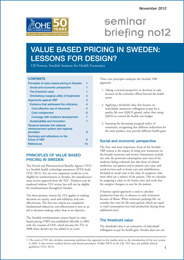Sign up to our newsletter Subscribe
Analysing Global Immunisation Expenditure

Sign up to our newsletter Subscribe


OHE has just published a Seminar Briefing by Ulf Persson, head of the Swedish Institute of Health Economics, which reviews experience with the Swedish value based pricing (VBP) system. Prof Persson is a member of the board of the TLV,…

OHE has just published a Seminar Briefing by Ulf Persson, head of the Swedish Institute of Health Economics, which reviews experience with the Swedish value based pricing (VBP) system. Prof Persson is a member of the board of the TLV, which is the health technology assessment (HTA) agency in Sweden.
OHE has just published a Seminar Briefing by Ulf Persson, head of the Swedish Institute of Health Economics, which reviews experience with the Swedish value based pricing (VBP) system. Prof Persson is a member of the board of the TLV, which is the health technology assessment (HTA) agency in Sweden.
In Sweden, the TLV makes decisions on the reimbursement status of new medicines, under a system introduced in 2002. Its decisions both affect prices across the country and determine reimbursement eligibility under the national insurance system.
Three criteria drive decisions in Sweden about whether a new therapy will be eligible for reimbursement: equity, need/solidarity and cost-effectiveness. The first two are considered of greater importance than cost-effectiveness, which is seen as an aid in decision making rather than an objective per se.
Three core principles underlie the Swedish VBP system; the approach is unlike that in other countries. First, a societal perspective is adopted that explicitly takes into account economic effects beyond the health sector. This may include the value of caregivers’ time and foregone income, a societal cost often poorly recognised in HTA systems. Second, Sweden does not have a notional “threshold” QALY value based on health care budget targets but, instead, focuses on individuals’ willingness to pay for a QALY. Prof Persson notes some of the research that has been done to begin to define willingness-to-pay QALYs. He also discusses how the threshold can vary with disease severity and how this is taken into account by the TLV. Third, Sweden recognises explicitly that some indications for the same medicine may provide greater health gains than others. This can be a factor in determining whether and at what level to reimburse a new treatment.
Sweden’s HTA system is aimed not just at controlling costs, but also at encouraging innovation by allocating funds to new and better treatments. Sweden’s willingness to adopt “coverage with evidence development” as a way of making new therapies available earlier is evidence of commitment to timely access.
Prof Persson points out some of the challenges that Sweden has faced. One that will be an issue in any VBP system is how to assess orphan drugs, whose costs per QALY are likely to be high. Sweden has made extensive use of coverage with evidence development to allow reimbursement for orphan drugs and approved all but one of the 30 applications for reimbursement received between 2003 and 2010. Other issues in Sweden’s VBP system have less to do with HTA than with uneven implementation across Sweden’s county councils, which hold responsibility for health budgets.
Overall, Prof Persson views the Swedish version of VBP as successful. Spending on medicines has not increased more rapidly than for other health care resources, which some critics had feared; VBP based on society’s willingness to pay has not resulted in high prices; and VBP has been used to reward innovation.
Download Persson, U. (2012) Value based pricing in Sweden: Lessons for design? Seminar Briefing. 12. London: Office of Health Economics.
An error has occurred, please try again later.
This website uses cookies so that we can provide you with the best user experience possible. Cookie information is stored in your browser and performs functions such as recognising you when you return to our website and helping our team to understand which sections of the website you find most interesting and useful.
Strictly Necessary Cookie should be enabled at all times so that we can save your preferences for cookie settings.
If you disable this cookie, we will not be able to save your preferences. This means that every time you visit this website you will need to enable or disable cookies again.
This website uses Google Analytics to collect anonymous information such as the number of visitors to the site, and the most popular pages.
Keeping this cookie enabled helps us to improve our website.
Please enable Strictly Necessary Cookies first so that we can save your preferences!


